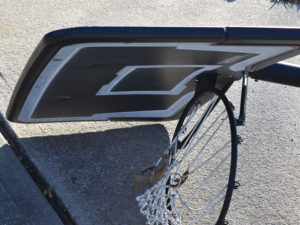It is not uncommon to come across rules regarding basketball hoops in HOA communities. But, can homeowners associations even enforce such rules?
Regulating Basketball Hoops in HOA Communities
Basketball is one of the most popular sports in the United States, especially among the younger generations. As such, it is not uncommon to see basketball hoops in homes across the country. The problem, though, is that not all homeowners are permitted to install basketball hoops even on their own private property. Homes that are bound to homeowners associations must abide by the architectural standards in such communities.
The reason some HOAs don’t allow basketball hoops is due to the nuisance they pose. Homeowners with kids want to install them, but not all neighbors want to hear the sound of a basketball pounding on the backboard or the driveway all day long. And, believe it or not, basketball hoops in HOA communities are a bigger issue than a lot of people think.
What Do State Laws Say?
There are some structures that HOAs are legally not allowed to prohibit. For instance, the Over-the-Air Reception Devices Rule (OTARD) is a federal law that forbids HOAs from banning satellites and antennas for telecommunications. While no federal law currently exists for basketball hoops in HOAs, there may be laws at the state or local level.
One such example is Maryland. Approved by the Governor, House Bill 1347 prohibits unreasonable limitations on the use and placement of a portable basketball apparatus on a homeowner’s property. While associations can impose restrictions, they can’t be “unreasonable.” Additionally, the property owner should own or have a right to exclusive use of the area where the apparatus is to be placed or used.
The Problem With Portable Basketball Hoops
 Some homeowners associations explicitly prohibit the installation of fixed basketball hoops. Others only allow them in certain areas of the property, such as at the side or at the back of the home.
Some homeowners associations explicitly prohibit the installation of fixed basketball hoops. Others only allow them in certain areas of the property, such as at the side or at the back of the home.
Sometimes, an association’s governing documents won’t expressly prohibit basketball hoops but lump them under a more general term like “recreational structures.”
In cases where the documents explicitly restrict fixed basketball hoops, though, confusion may arise when an owner puts up a portable one instead. Experts disagree on whether or not an HOA with an explicit restriction on fixed basketball hoops can enforce the same restriction on portable hoops as well.
Portable basketball hoops are not secured, so they pose certain dangers. For example, a portable basketball hoop in the driveway may collapse and find its way onto the street, blocking traffic. Portable basketball hoops on the street in an HOA community are a huge safety concern, too. Because portable hoops aren’t fastened to a structure, they can also be blown away by strong winds.
All things considered, it is important to be specific when crafting your policy. Some of the rules you might want to add include:
- Allowing portable basketball hoops in only certain areas of the property.
- If used in driveways, owners should remove them when not in use as they can affect curb appeal.
- Only allowing the use of portable basketball hoops during certain hours of the day to avoid noise issues.
- When not in use, owners must store portable basketball hoops in a way that they are not visible from the street.
Vulnerable to Discriminatory Claims
Association boards are advised to proceed with caution when passing rules about basketball hoops. Some experts think that such rules can be interpreted as discriminatory, similar to pool age restrictions. This is because banning basketball hoops may be akin to prohibiting kids from playing. To avoid potential liability, HOA boards should hire an attorney to help them craft their rules so that they don’t violate the Fair Housing Act or any other laws.
Real-Life Cases
Homeowners associations often make headlines for a number of reasons. And, surprisingly, basketball hoops are one of them.
Confusing Directions
A couple in Indiana, for instance, was asked by their association to remove the basketball hoop in their driveway because it was in violation of the community guidelines. The couple, Matt & Alissa Phegley, had asked for permission from their HOA to install an in-ground hoop a year and a half prior. The Stones Crossing Homeowners Association denied their request and told them they could use a portable hoop instead. However, the HOA backtracked on that and later said the portable hoop also violated the rules.
The couple attempted to communicate with the HOA to reach some sort of agreement. However, they haven’t been receiving any response. The Phegleys resorted to starting a petition, asking neighbors who were in favor of basketball hoops to sign it. Interestingly, the HOA, which is made up of different sections, allows basketball hoops in some sections but not where the Phegleys live.
Hoop Removed
In another HOA in North Carolina, a mom felt frustrated over the association’s order to remove her son’s basketball hoop. Lindsey Van Winkle said she received a letter from Kingstree HOA telling her the hoop must be removed. She and her son, 11-year-old Noah, tried to plead their case. They even started a petition showing the support of their neighbors. But, it didn’t work.
Van Winkle is particularly perplexed that the HOA only decided to say something 7 years after the fact. A legal expert, though, says that the covenant shouldn’t have been enforceable anymore. According to the expert, the North Carolina Court of Appeals has a 6-year statute of limitations on restrictive covenants like the restriction on basketball hoops.
For HOA Boards and Homeowners
When it comes to basketball hoops in HOA communities, homeowners should look to their governing documents. These documents should provide them with guidance on whether or not they can install fixed or portable hoops on their property. Boards, on the other hand, should clarify the rules on basketball hoops and consider amending their governing documents to reflect these clarifications. This way, there can be no room for any misunderstandings or misinterpretations.
Keeping up with federal and state laws as well as your governing documents can come as a challenge. Delegate the job to an HOA management company like Cedar Management Group. Give us a call today at (877) 252-3327 or email us at help@mycmg.com to know more about how we can help you.
RELATED ARTICLES:
- HOA Rules Enforcement: Best Practices To Follow
- What Can The Board Do With Stray Animals In An HOA Community?
- Can An HOA Deny Request For Reasonable Accommodation?







